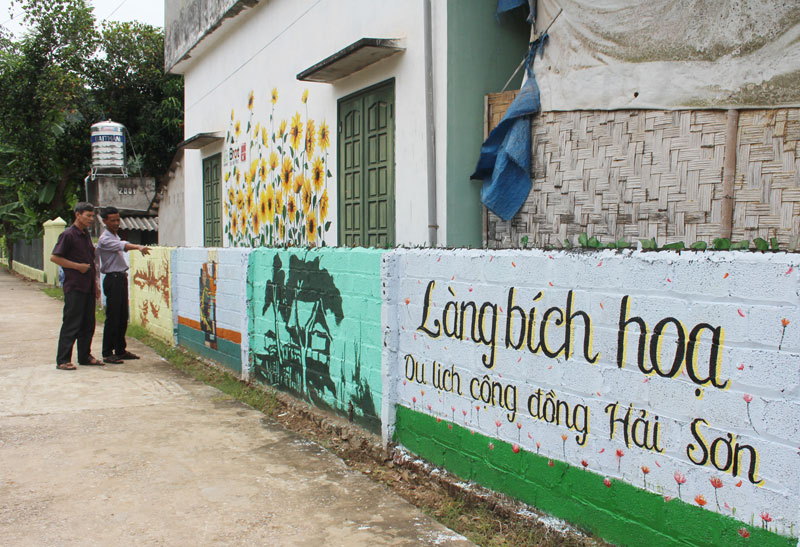
(HBO) – A 800-metre road section of 15 households in Hai Son hamlet, Mai Hich commune (Mai Chau district, Hoa Binh province) was previously full of moss and weeds. With the helping hands of 27 voluntary students from the Hanoi University of Fine Arts, the village has been covered with colourful paintings featuring the unique culture of the Thai ethnic minority group.

Thanks to a
project of the Centre for Community Health and Development (COHED), Mai Hich
commune (Mai Chau district) now has a new name as "Hai Son community-based
tourism fresco village”
The activity was inspired by the Centre for
Community Health and Development (COHED) as part of a project designed to
develop rural areas via environmentally friendly community-based tourism
sponsored by the Bread for the World (BFW) with the target of improving living conditions
of ethnic people in
Vietnam.
Through which, community-based tourism initiatives have generated incomes for
ethnic people in Mai Chau district. The paintings were created by voluntary
students and COHED staff along with residents in Hai Son hamlet. After eight
days of working hard, they changed the grey walls into lively paintings.
Not only painting on the wall, vegetable fences
were also decorated. Children in the hamlet were encouraged to join the
activity with the assistance from voluntary students. Children were
enthusiastic to create lovely pictures highlighting the beauty of their
countryside.
Nowadays, when arriving in Hai Son hamlet,
visitors could put their souls into the nature of the Mai Chau mountainous
region which is poetic through pictures capturing four seasons of the year as
well as the daily life of people such as rice sowing, cultivating and pounding,
along with gong culture, drinking "ruou can” (literally "stem wine"
or "tube wine”), and enjoying "mua sap” (dance of the bamboo)
performances.
Hai Son is a poor hamlet in Mai Hich commune,
mainly cultivating rice and vegetables. Locals enjoy a peaceful life but still
face many difficulties. Endowed with natural advantages, locals hope to
introduce the natural beauty of their land to visitors to develop
community-based tourism and increase their incomes.
Head of Hai Son hamlet Dam Quang Thuong said the
COHED project has empowered local residents to develop community-based tourism.
At present, the hamlet is opening a training course for people to provide homestay
services, focusing on keeping the clean environment. Tourists could experience
local daily activities such as growing rice, weaving brocade and cooking local
special dishes.
The Bac Son pre-school in Hung Son commune, Kim Boi district is effectively implementing a model of preserving and promoting cultural identity of the Muong ethnic group.
Through ups and downs, many unique cultural features of the Muong ethnic minority group are facing risks of falling into oblivion. However, with a strong determination, Lac Son district of Hoa Binh province has deployed synchronous solutions to preserve and promote the locality's cultural heritage values.
If Tan Lac is considered the core of the cradle of Muong culture in Hoa Binh, Phong Phu commune is the cultural centre of Muong culture in Tan Lac district. Luy Ai hamlet in Phong Phu commune is where customs and traditions of Muong Bi are preserved. Luy Ai hamlet was chosen to build a space to preserve Muong ethnic culture. The district is seeking support from the province and coordinating with relevant agencies to devise a plan on preservation of Muong cultural spaces associated with developing tourism products and improving the lives of local residents.
Nguyen Manh Tuan, a Muong ethnic man in Ba Hang Doi town, Lac Thuy district, is known as a young, dedicated, and outstanding artisan who has made significant contributions in collecting, restoring, and preserving national cultural values.
The Government Office with Document No. 2082/VPCP-KGVX, dated March 29, 2024, sent out the opinion of Deputy Prime Minister Tran Hong Ha regarding the submission of the "Mo Muong" and "Cheo art" dossiers to the United Nations Educational, Scientific and Cultural Organization (UNESCO).



